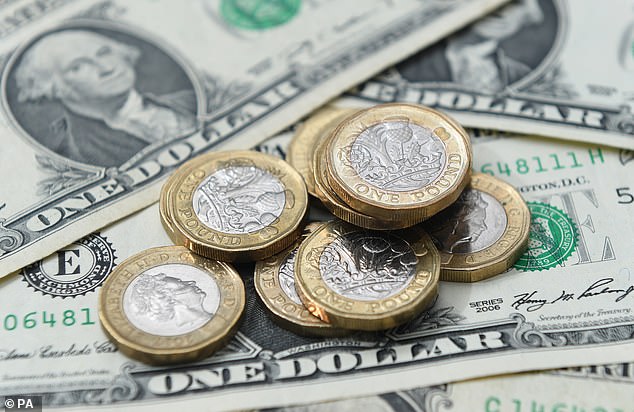The recent rise in the sterling exchange rate against the dollar has gone almost unremarked.
Concern about the mayhem caused by the threat and reality of Trump tariffs, verbal assaults on the Federal Reserve and worries about the federal budget deficit have driven the US currency down and the pound higher.
Stronger sterling acts as a barrier against imported inflation. That should provide some comfort ahead of today’s release of consumer prices projected to climb to 3p or above.
Inflation is being driven higher by regulated energy bills and labour costs following the rise in employers’ National Insurance last month and the living wage.
The dollar has fallen 10.6 per cent against an index of foreign currencies since January – one of the sharpest three-month declines in recent history.
Sterling is among the winners. Returning from a recent reporting trip to the US, I was surprised that my overpriced hotel bill had been translated back to sterling at a reasonable $1.32 exchange rate.

Recovery: The pound climbed to $1.34, its highest level in four years in latest trading having plunged towards parity with the greenback during the Truss tantrum in September 2022
The pound climbed to $1.34, its highest level in four years, in latest trading – having plunged towards parity with the greenback during the Truss tantrum in September 2022. Reasons behind the pound’s rise are manifold.
UK bank rate at 4.25 per cent is elevated despite four cuts in the last year. Growth in the first quarter outpaced G7’s rich competitors and confidence in American economic leadership has been eviscerated.
Sterling’s revival will be encouraging for British travellers to America this summer. The pound’s advance is an unexpected gift for UK consumers and the Bank of England. Oil, gas and other raw materials and many intermediate goods are priced in dollars and should become less expensive.
The impact should not be underestimated. The Bank of England’s chief economist Huw Pill argues that quarterly cuts in interest rates since midway through last year had been ‘too rapid’. He says that disinflation is ‘not complete’.
That explains why he was among the interest rate setters to vote against a cut at last week’s three-way split session of the Monetary Policy Committee.
Pill’s hard line chimes more with the Fed than Britain’s new friends in Brussels. Business, consumers and the Government itself need cheaper borrowing to foster growth and offset £40billion of punishing Labour tax hikes.
Crossed lines
Vodafone has made terrible decisions since it slipped from being the world’s biggest mobile player to an also-ran.
Few have been more costly than the £15.5billion of shareholder funds poured down the drain in 2019 when former chief executive Nick Read bought German cable operations from Liberty Media.
Since then, Voda shares have tumbled 40 per cent and the write-downs continue with £3.9billion wiped off the value of operations in Germany and Romania in the last financial year.
Chief executive Margherita Della Valle is optimistic that the worst is over in Germany after a 50 per cent slump in the TV
customer base as it adjusted to a change governing consumer choice in apartment blocks.
But who can be sure? Della Valle’s best hope for the future rests in the UK, having persuaded the competition authorities that a £16.5billion merger of its UK business with Three would be a good thing.
She promised heavy investment in a dilapidated network starting with £1.5billion in the coming year.
Better service but doubtless at higher prices for consumers. A promised £1.7billion share buyback provided a temporary respite for the stock. But Della Valle is swimming against heavy tides.
Gas guzzler
If Shell boss Wael Sawan is plotting to create a great British energy champion by buying BP, his ambition is well disguised.
Sawan cautioned at the company’s annual meeting that the bar for mega-deals was ‘very high’ and prioritised buybacks and liquefied natural gas (LNG).
The LNG push raised investor ire with activists winning 20.6 per cent support for a resolution requiring the firm to report on how the pursuit of gas is compatible with cutting carbon emissions.
One suspects the only way to tempt Shell into the BP fray would be if one of the US majors – Exxon or Chevron – showed an interest.
Then the bar for a British buyer could be lowered very rapidly in the name of future-proofing UK energy security and the FTSE 100.
DIY INVESTING PLATFORMS

AJ Bell

AJ Bell
Easy investing and ready-made portfolios

Hargreaves Lansdown

Hargreaves Lansdown
Free fund dealing and investment ideas

interactive investor

interactive investor
Flat-fee investing from £4.99 per month

InvestEngine

InvestEngine
Account and trading fee-free ETF investing
Trading 212
Trading 212
Free share dealing and no account fee
Affiliate links: If you take out a product This is Money may earn a commission. These deals are chosen by our editorial team, as we think they are worth highlighting. This does not affect our editorial independence.
This article was originally published by a www.dailymail.co.uk . Read the Original article here. .


